Chuck Berry (1926-2017)
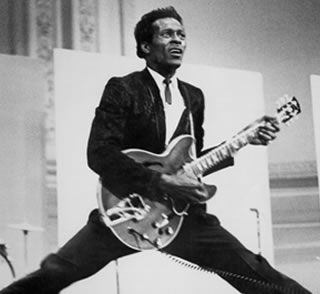 Chuck Berry was an American singer, songwriter, musician, and one of the pioneers of rock and roll music. With songs such as “Maybellene” (1955), “Roll Over Beethoven” (1956), “Rock and Roll Music” (1957) and “Johnny B. Goode” (1958), Berry refined and developed rhythm and blues into the major elements that made rock and roll distinctive. Writing lyrics that focused on teen life and consumerism, and developing a music style that included guitar solos and showmanship, Berry was a major influence on subsequent rock music.
Chuck Berry was an American singer, songwriter, musician, and one of the pioneers of rock and roll music. With songs such as “Maybellene” (1955), “Roll Over Beethoven” (1956), “Rock and Roll Music” (1957) and “Johnny B. Goode” (1958), Berry refined and developed rhythm and blues into the major elements that made rock and roll distinctive. Writing lyrics that focused on teen life and consumerism, and developing a music style that included guitar solos and showmanship, Berry was a major influence on subsequent rock music.
Born into a middle-class African-American family in St. Louis, Missouri, Berry had an interest in music from an early age and gave his first public performance at Sumner High School. While still a high school student he was convicted of armed robbery and was sent to a reformatory, where he was held from 1944 to 1947. After his release, Berry settled into married life and worked at an automobile assembly plant. By early 1953, influenced by the guitar riffs and showmanship techniques of the blues musician T-Bone Walker, Berry began performing with the Johnnie Johnson Trio.
His break came when he traveled to Chicago in May 1955 and met Muddy Waters, who suggested he contact Leonard Chess, of Chess Records. With Chess, he recorded “Maybellene”—Berry’s adaptation of the country song “Ida Red”—which sold over a million copies, reaching number one on Billboard magazine’s rhythm and blues chart. By the end of the 1950s, Berry was an established star, with several hit records and film appearances and a lucrative touring career. He had also established his own St. Louis nightclub, Berry’s Club Bandstand. But in January 1962, he was sentenced to three years in prison for offenses under the Mann Act—he had transported a 14-year-old girl across state lines.
After his release in 1963, Berry had several more hits, including “No Particular Place to Go”, “You Never Can Tell”, and “Nadine”. But these did not achieve the same success, or lasting impact, of his 1950s songs, and by the 1970s he was more in demand as a nostalgic performer, playing his past hits with local backup bands of variable quality. His insistence on being paid in cash led in 1979 to a four-month jail sentence and community service, for tax evasion.
Berry was among the first musicians to be inducted into the Rock and Roll Hall of Fame on its opening in 1986; he was cited for having “laid the groundwork for not only a rock and roll sound but a rock and roll stance.”
James Brown (1933-2006)
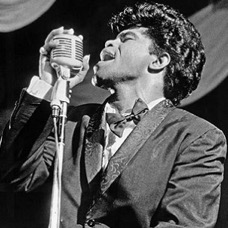 James Brown was an American singer, songwriter, musician, and one of the pioneers of rock and roll music. With songs such as “Maybellene” (1955), “Roll Over Beethoven” (1956), “Rock and Roll Music” (1957) and “Johnny B. Goode” (1958), Berry refined and developed rhythm and blues into the major elements that made rock and roll distinctive. Writing lyrics that focused on teen life and consumerism, and developing a music style that included guitar solos and showmanship, Berry was a major influence on subsequent rock music.
James Brown was an American singer, songwriter, musician, and one of the pioneers of rock and roll music. With songs such as “Maybellene” (1955), “Roll Over Beethoven” (1956), “Rock and Roll Music” (1957) and “Johnny B. Goode” (1958), Berry refined and developed rhythm and blues into the major elements that made rock and roll distinctive. Writing lyrics that focused on teen life and consumerism, and developing a music style that included guitar solos and showmanship, Berry was a major influence on subsequent rock music.
Born into a middle-class African-American family in St. Louis, Missouri, Berry had an interest in music from an early age and gave his first public performance at Sumner High School. While still a high school student he was convicted of armed robbery and was sent to a reformatory, where he was held from 1944 to 1947. After his release, Berry settled into married life and worked at an automobile assembly plant. By early 1953, influenced by the guitar riffs and showmanship techniques of the blues musician T-Bone Walker, Berry began performing with the Johnnie Johnson Trio.
His break came when he traveled to Chicago in May 1955 and met Muddy Waters, who suggested he contact Leonard Chess, of Chess Records. With Chess, he recorded “Maybellene”—Berry’s adaptation of the country song “Ida Red”—which sold over a million copies, reaching number one on Billboard magazine’s rhythm and blues chart. By the end of the 1950s, Berry was an established star, with several hit records and film appearances and a lucrative touring career. He had also established his own St. Louis nightclub, Berry’s Club Bandstand. But in January 1962, he was sentenced to three years in prison for offenses under the Mann Act—he had transported a 14-year-old girl across state lines. After his release in 1963, Berry had several more hits, including “No Particular Place to Go”, “You Never Can Tell”, and “Nadine”. But these did not achieve the same success, or lasting impact, of his 1950s songs, and by the 1970s he was more in demand as a nostalgic performer, playing his past hits with local backup bands of variable quality. His insistence on being paid in cash led in 1979 to a four-month jail sentence and community service, for tax evasion.
Berry was among the first musicians to be inducted into the Rock and Roll Hall of Fame on its opening in 1986; he was cited for having “laid the groundwork for not only a rock and roll sound but a rock and roll stance.”
Eddie Cochran (1938-1960)
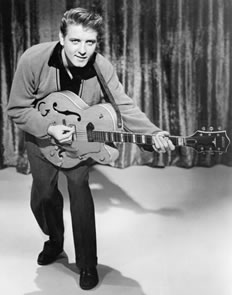 Eddie Cochran was an American musician. Cochran’s rockabilly songs, such as “Twenty Flight Rock”, “Summertime Blues”, “C’mon Everybody”, and “Somethin’ Else”, captured teenage frustration and desire in the mid-1950s and early 1960s. He experimented with multitrack recording, distortion techniques, and overdubbing even on his earliest singles. He played the guitar, piano, bass, and drums. His image as a sharply dressed and good-looking young man with a rebellious attitude epitomized the stance of the 1950s rocker, and in death he achieved an iconic status.
Eddie Cochran was an American musician. Cochran’s rockabilly songs, such as “Twenty Flight Rock”, “Summertime Blues”, “C’mon Everybody”, and “Somethin’ Else”, captured teenage frustration and desire in the mid-1950s and early 1960s. He experimented with multitrack recording, distortion techniques, and overdubbing even on his earliest singles. He played the guitar, piano, bass, and drums. His image as a sharply dressed and good-looking young man with a rebellious attitude epitomized the stance of the 1950s rocker, and in death he achieved an iconic status.
Cochran was involved with music from an early age, playing in the school band and teaching himself to play blues guitar. In 1954, he formed a duet with the guitarist Hank Cochran (no relation), and when they split the following year, Eddie began a songwriting career with Jerry Capehart. His first success came when he performed the song “Twenty Flight Rock” in the film The Girl Can’t Help It, starring Jayne Mansfield. Soon afterwards, he signed a recording contract with Liberty Records.
Cochran died at age 21 after a road accident, while traveling in a taxi in Chippenham, Wiltshire, during his British tour in April 1960, having just performed at Bristol’s Hippodrome theatre. Though his best-known songs were released during his lifetime, more of his songs were released posthumously. In 1987 Cochran was inducted into the Rock and Roll Hall of Fame. His songs have been recorded by a wide variety of recording artists.
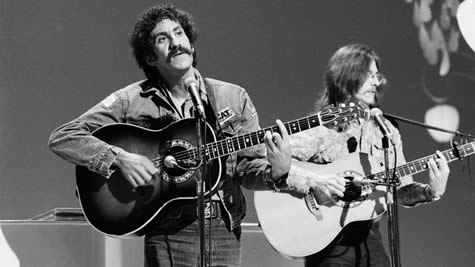 Jim Croce (1943-1973)
Jim Croce (1943-1973)
Jim Croce Was an American folk and rock singer of the late 1960s and early 1970s. Between 1966 and 1973, Croce released five studio albums and singles. His songs “Bad, Bad Leroy Brown” and “Time in a Bottle” reached No. 1 on the U.S. Billboard Hot 100 chart.
Croce did not take music seriously until he studied at Villanova, where he formed bands and performed at fraternity parties, coffee houses, and universities around Philadelphia, playing “anything that the people wanted to hear: blues, rock, a cappella, railroad music … anything.” Croce’s band was chosen for a foreign exchange tour of Africa, the Middle East, and Yugoslavia. He later said, “We just ate what the people ate, lived in the woods, and played our songs. Of course they didn’t speak English over there but if you mean what you’re singing, people understand.” On November 29, 1963 Croce met his future wife Ingrid Jacobson at the Philadelphia Convention Hall during a hootenanny, where he was judging a contest.
Croce released his first album, Facets, in 1966, with 500 copies pressed. The album had been financed with a $500 wedding gift from Croce’s parents, who set a condition that the money must be spent to make an album. They hoped that he would give up music after the album failed, and use his college education to pursue a “respectable” profession. However, the album proved a success, with every copy sold.
1960s
From the mid-1960s to early 1970s, Croce performed with his wife as a duo. At first, their performances included songs by artists such as Ian & Sylvia, Gordon Lightfoot, Joan Baez, and Arlo Guthrie, but in time they began writing their own music. During this time, Croce got his first long-term gig at a suburban bar and steakhouse in Lima, Pennsylvania, called The Riddle Paddock. His set list covered several genres, including blues, country, rock and roll, and folk.
Croce married his wife Ingrid in 1966, and converted to Judaism, as his wife was Jewish. He and Ingrid were married in a traditional Jewish ceremony. He enlisted in the Army National Guard that same year to avoid being drafted and deployed to Vietnam, and served on active duty for four months, leaving for duty a week after his honeymoon. Croce, who was not good with authority, had to go through basic training twice. He said he would be prepared if “there’s ever a war where we have to defend ourselves with mops”.
In 1968, the Croces were encouraged by record producer Tommy West to move to New York City. The couple spent time in the Kingsbridge section of the Bronx and recorded their first album with Capitol Records. During the next two years, they drove more than 300,000 miles, playing small clubs and concerts on the college concert circuit promoting their album Jim & Ingrid Croce.
Becoming disillusioned by the music business and New York City, they sold all but one guitar to pay the rent and returned to the Pennsylvania countryside, settling in an old farm in Lyndell, where after playing for $25 a night (US$154 in 2016 dollars) wasn’t enough money to live on, Croce was forced to take odd jobs such as driving trucks, construction work and teaching guitar to pay the bills[14] while continuing to write songs, often about the characters he would meet at the local bars and truck stops and his experiences at work; these provided the material for such songs as “Big Wheel” and “Workin’ at the Car Wash Blues”.
1970s
They returned to Philadelphia and Croce decided to be “serious” about becoming a productive member of society. In 1970, Croce met classically trained pianist-guitarist and singer-songwriter Maury Muehleisen from Trenton, New Jersey, through producer Joe Salviuolo. Salviuolo and Croce had been friends when they studied at Villanova University, and Salviuolo had met Muehleisen when he was teaching at Glassboro State College in New Jersey. Salviuolo brought Croce and Muehleisen together at the production office of Tommy West and Terry Cashman in New York City. Croce at first backed Muehleisen on guitar, but gradually their roles reversed, with Muehleisen adding lead guitar to Croce’s music.
In 1972, Croce signed a three-record contract with ABC Records, releasing two albums, You Don’t Mess Around with Jim and Life and Times. The singles “You Don’t Mess Around with Jim”, “Operator (That’s Not the Way It Feels)”, and “Time in a Bottle” (written for his then-unborn son, A. J. Croce all received airplay. Croce’s biggest single, “Bad, Bad Leroy Brown”, reached Number 1 on the American charts in July 1973. Also that year, the Croces moved to San Diego, California.
Croce began touring the United States with Muehleisen, performing in large coffee houses, on college campuses, and at folk festivals. However, his financial situation was still bad. The record company had fronted him the money to record his album, and much of what it earned went to pay back the advance. In February 1973, Croce and Muehleisen travelled to Europe, promoting the album in London, Paris, Amsterdam, Monte Carlo, Zurich, and Dublin, receiving positive reviews. Croce then began appearing on television, including his national debut on American Bandstand[16] on August 12, 1972, The Tonight Show on August 14, 1972, The Dick Cavett Show on September 20/21 1972, The Helen Reddy Show airing July 19, 1973 and the newly launched The Midnight Special, which he co-hosted airing June 15. From July 16 through August 4, 1973, Croce and Muehleisen returned to London and performed on The Old Grey Whistle Test where they sang “Lover’s Cross” and “Workin’ at the Car Wash Blues” from their upcoming album “I Got a Name”. Croce finished recording the album I Got a Name just one week before his death. While on his tours, he grew increasingly homesick, and decided to take a break from music and settle with his wife and infant son when his Life and Times tour ended. In a letter to his wife which arrived after his death, Croce told her he had decided to quit music and stick to writing short stories and movie scripts as a career, and withdraw from public life.
Death
On Thursday, September 20, 1973, during Croce’s Life and Times tour and the day before his ABC single “I Got a Name” was released, Croce and five others died when their chartered Beechcraft E18S crashed into a tree, while taking off from the Natchitoches Regional Airport in Natchitoches, Louisiana. Others killed in the crash were pilot Robert N. Elliott, musician Maury Muehleisen, comedian George Stevens, manager and booking agent Kenneth D. Cortose, and road manager Dennis Rast. Croce had just completed a concert at Northwestern State University’s Prather Coliseum in Natchitoches and was flying to Sherman, Texas, for a concert at Austin College. The plane crashed an hour after the concert. Croce was 30 years old.
Ritchie Valens (1941-1959)
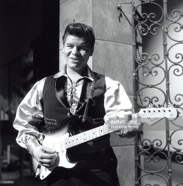 Ritchie Valens was an American singer, songwriter, and guitarist. A rock & roll pioneer and a forefather of the Chicano rock movement, Valens’ recording career lasted eight months, as it abruptly ended when he died in a plane crash.
Ritchie Valens was an American singer, songwriter, and guitarist. A rock & roll pioneer and a forefather of the Chicano rock movement, Valens’ recording career lasted eight months, as it abruptly ended when he died in a plane crash.
During this time, he had several hits, most notably “La Bamba”, which he had adapted from a Mexican folk song. Valens transformed the song into one with a rock rhythm and beat, and it became a hit in 1958, making Valens a pioneer of the Spanish-speaking rock and roll movement.
On February 3, 1959, on what has become known as “the Day the Music Died”, Valens died in a plane crash in Iowa, an accident that also claimed the lives of fellow musicians Buddy Holly and J. P. “The Big Bopper” Richardson, as well as pilot Roger Peterson. Valens was inducted into the Rock and Roll Hall of Fame in 2001.
Stevie Ray Vaughan (1954-1990)
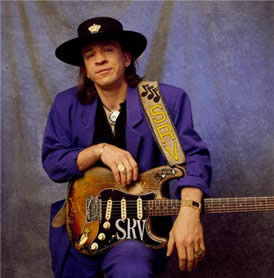 Stevie Ray Vaughan was an American musician, singer, songwriter, and record producer. In spite of a short-lived mainstream career spanning seven years, he was one of the most influential guitarists in the revival of blues in the 1980s. AllMusic describes him as “a rocking powerhouse of a guitarist who gave blues a burst of momentum in the ’80s, with influence still felt long after his tragic death.”
Stevie Ray Vaughan was an American musician, singer, songwriter, and record producer. In spite of a short-lived mainstream career spanning seven years, he was one of the most influential guitarists in the revival of blues in the 1980s. AllMusic describes him as “a rocking powerhouse of a guitarist who gave blues a burst of momentum in the ’80s, with influence still felt long after his tragic death.”
Born and raised in Dallas, Texas, Vaughan began playing guitar at the age of seven, inspired by his older brother Jimmie. In 1971 he dropped out of high school, and moved to Austin the following year. He played gigs with numerous bands after receiving guitar lessons from Jordan Kell, earning a spot in Marc Benno’s band, the Nightcrawlers, and later with Denny Freeman in the Cobras, with whom he continued to work through late 1977. He then formed his own group, Triple Threat Revue, before renaming the band Double Trouble after hiring drummer Chris Layton and bassist Tommy Shannon. He gained fame after his performance at the Montreux Jazz Festival in 1982, and in 1983 his debut studio album, Texas Flood, charted at number 38. The ten-song album was a commercially successful release that sold over half a million copies. After achieving sobriety in late 1986, he headlined concert tours with Jeff Beck in 1989 and Joe Cocker in 1990 before his death in a helicopter crash on August 27, 1990, at the age of 35.
Vaughan was inspired musically by American and British blues rock. He favored clean amplifiers with high volume and contributed to the popularity of vintage musical equipment. He often combined several different amplifiers together and used minimal effects pedals.
Jackie Wilson (1934-1984)
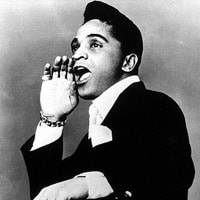 Jackie Wilson was an American soul singer-songwriter and performer. A tenor with a four octave vocal range, he was nicknamed “Mr. Excitement”, and was important in the transition of rhythm and blues into soul. He was considered a master showman, and one of the most dynamic and influential singers and performers in R&B and rock ‘n’ roll history. Gaining fame in his early years as a member of the R&B vocal group Billy Ward and His Dominoes, he went solo in 1957 and recorded over 50 hit singles that spanned R&B, pop, soul, doo-wop and easy listening. This included 16 R&B Top 10 hits, including six R&B number ones. On the Billboard Hot 100, he scored 14 Top 20 Pop hits, six of which made it into the Pop Top 10.
Jackie Wilson was an American soul singer-songwriter and performer. A tenor with a four octave vocal range, he was nicknamed “Mr. Excitement”, and was important in the transition of rhythm and blues into soul. He was considered a master showman, and one of the most dynamic and influential singers and performers in R&B and rock ‘n’ roll history. Gaining fame in his early years as a member of the R&B vocal group Billy Ward and His Dominoes, he went solo in 1957 and recorded over 50 hit singles that spanned R&B, pop, soul, doo-wop and easy listening. This included 16 R&B Top 10 hits, including six R&B number ones. On the Billboard Hot 100, he scored 14 Top 20 Pop hits, six of which made it into the Pop Top 10.
On September 29, 1975, while headlining a Dick Clark Oldies Concert, he collapsed on stage from what was later determined to be a massive heart attack, and subsequently slipped into a coma, slowly awakening over a period of 8 months. He remained semi-comatose for the nine years until his death in 1984, at the age of 49. Wilson was one of the most influential artists of his generation and an inspiration to other singers including Elvis Presley, James Brown and Michael Jackson.
A two-time Grammy Hall of Fame Inductee, Wilson was inducted to the Rock and Roll Hall of Fame in 1987
Roy Orbison (1936-1988)
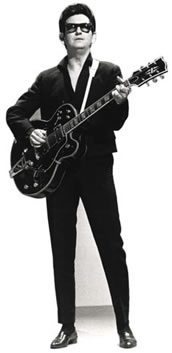 Roy Orbison was an American singer-songwriter known for his distinctive, impassioned voice, complex song structures, and dark emotional ballads. The combination led many critics to describe his music as operatic, nicknaming him “the Caruso of Rock” and “the Big O.” Between 1960 and 1964, 22 of his songs placed on the Billboard Top 40, including “Only the Lonely” (1960), “Crying” (1961), “In Dreams” (1963), and “Oh, Pretty Woman” (1964).
Roy Orbison was an American singer-songwriter known for his distinctive, impassioned voice, complex song structures, and dark emotional ballads. The combination led many critics to describe his music as operatic, nicknaming him “the Caruso of Rock” and “the Big O.” Between 1960 and 1964, 22 of his songs placed on the Billboard Top 40, including “Only the Lonely” (1960), “Crying” (1961), “In Dreams” (1963), and “Oh, Pretty Woman” (1964).
Born in Texas, Orbison began singing in a rockabilly and country and western band in high school. He was signed by Sam Phillips, Sun Records in 1956, but his greatest success came with Monument Records in the early 1960s. While most male rock and roll performers in the 1950s and 1960s projected a defiant masculinity, many of Orbison’s songs instead conveyed a quiet, almost desperate, vulnerability. His voice ranged from baritone to tenor, and music scholars have suggested that he had a three- or four-octave range. During performances, he was known for standing still and solitary, and for wearing black clothes, to match his jet black hair and dark sunglasses, which lent an air of mystery to his persona.
From the late 1960s to late 1970s, Orbison was marred by a number of personal tragedies while his record sales declined. He experienced a resurgence in popularity through the success of several cover versions of his songs and the use of his 1963 song “In Dreams” in David Lynch’s film Blue Velvet (1986) and his hit “Oh, Pretty Woman” as the title track to film Pretty Woman in 1990. In 1988, he co-founded the Traveling Wilburys supergroup with George Harrison, Bob Dylan, Tom Petty, and Jeff Lynne. Orbison recorded his last solo album, Mystery Girl, the same year but died of a heart attack shortly thereafter.
His honors include inductions into the Rock and Roll Hall of Fame in 1987, the Nashville Songwriters Hall of Fame in the same year, and the Songwriters Hall of Fame in 1989.
Dusty Springfield (1939-1999)
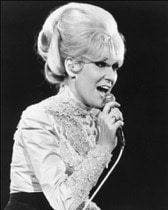 Dusty Springfield Was an English pop singer and record producer whose career extended from the late 1950s to the 1990s. With her distinctive sensual mezzo-soprano sound, she was an important blue-eyed soul singer and at her peak was one of the most successful British female performers, with six top 20 singles on the US Billboard Hot 100 and sixteen on the UK Singles Chart from 1963 to 1989.
Dusty Springfield Was an English pop singer and record producer whose career extended from the late 1950s to the 1990s. With her distinctive sensual mezzo-soprano sound, she was an important blue-eyed soul singer and at her peak was one of the most successful British female performers, with six top 20 singles on the US Billboard Hot 100 and sixteen on the UK Singles Chart from 1963 to 1989.
She is a member of the US Rock and Roll and UK Music Halls of Fame. International polls have named Springfield among the best female rock artists of all time. Her image, supported by a peroxide blonde bouffant hairstyle, evening gowns, and heavy make-up, as well as her flamboyant performances made her an icon of the Swinging Sixties.
Born in West Hampstead to a family that enjoyed music, Springfield learned to sing at home. In 1958 she joined her first professional group, The Lana Sisters, and two years later formed a pop-folk vocal trio, The Springfields, with her brother Tom Springfield and Tim Field. 1960-1963 The Springfields became the UK’s top selling act. Her solo career began in 1963 with the upbeat pop hit, “I Only Want to Be with You”. Among the hits that followed were “Wishin’ and Hopin’ ” (1964), “I Just Don’t Know What to Do with Myself” (1964), “You Don’t Have to Say You Love Me” (1966), and “Son of a Preacher Man” (1968).
As a fan of US soul music, she brought many little-known soul singers to the attention of a wider UK record-buying audience by hosting the first national TV performance of many top-selling Motown artists beginning in 1965.[3] Partly owing to these efforts, a year later she eventually became the best-selling female singer in the world and topped a number of popularity polls, including Melody Maker’s Best International Vocalist. Although she was never considered a Northern Soul artist in her own right, her efforts contributed a great deal to the formation of the genre as a result. She was the first UK singer to top the New Musical Express readers’ poll for Female Singer.
To boost her credibility as a soul artist, Springfield went to Memphis, Tennessee, to record Dusty in Memphis, an album of pop and soul music with the Atlantic Records main production team
Rick Nelson (1940-1985)
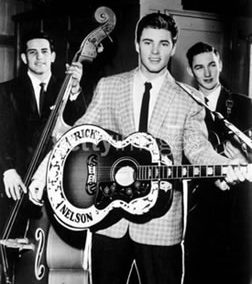 Rick Nelson was an American actor, musician, and singer-songwriter. From age eight he starred alongside his family in the radio and television series The Adventures of Ozzie and Harriet. In 1957 he began a long and successful career as a popular recording artist. As one of the top “teen idols” of the 1950s his fame led to a motion picture role co-starring alongside John Wayne and Dean Martin in Howard Hawks’s western feature film Rio Bravo (1959). He placed 53 songs on the Billboard Hot 100 between 1957 and 1973 including “Poor Little Fool”, which holds the distinction of being the first #1 song on Billboard magazine’s then-newly created Hot 100 chart. He recorded 19 additional Top 10 hits and was inducted into the Rock and Roll Hall of Fame on January 21, 1987. In 1996, he was ranked #49 on TV Guide’s 50 Greatest TV Stars of All Time.
Rick Nelson was an American actor, musician, and singer-songwriter. From age eight he starred alongside his family in the radio and television series The Adventures of Ozzie and Harriet. In 1957 he began a long and successful career as a popular recording artist. As one of the top “teen idols” of the 1950s his fame led to a motion picture role co-starring alongside John Wayne and Dean Martin in Howard Hawks’s western feature film Rio Bravo (1959). He placed 53 songs on the Billboard Hot 100 between 1957 and 1973 including “Poor Little Fool”, which holds the distinction of being the first #1 song on Billboard magazine’s then-newly created Hot 100 chart. He recorded 19 additional Top 10 hits and was inducted into the Rock and Roll Hall of Fame on January 21, 1987. In 1996, he was ranked #49 on TV Guide’s 50 Greatest TV Stars of All Time.
Nelson began his entertainment career in 1949 playing himself in the radio sitcom series The Adventures of Ozzie and Harriet. In 1952, he appeared in his first feature film, Here Come the Nelsons. In 1957, he recorded his first single, debuted as a singer on the television version of the sitcom, and released the #1 album entitled Ricky. In 1958, Nelson released his first #1 single, “Poor Little Fool”, and in 1959 received a Golden Globe nomination for “Most Promising Male Newcomer” after starring in Rio Bravo. A few films followed, and when the television series was cancelled in 1966, Nelson made occasional appearances as a guest star on various television programs.
Harry Chapin (1942-1981)
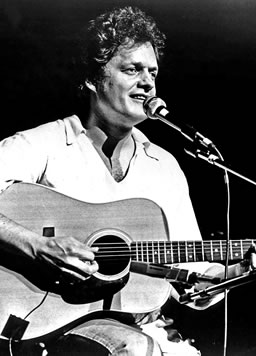 Harry Chapin was an American singer-songwriter best known for his folk rock songs including “Taxi”, “W*O*L*D”, and the number-one hit “Cat’s in the Cradle”.
Harry Chapin was an American singer-songwriter best known for his folk rock songs including “Taxi”, “W*O*L*D”, and the number-one hit “Cat’s in the Cradle”.
Chapin was also a dedicated humanitarian who fought to end world hunger; he was a key participant in the creation of the Presidential Commission on World Hunger in 1977.
In 1987, Chapin was posthumously awarded the Congressional Gold Medal for his humanitarian work.
